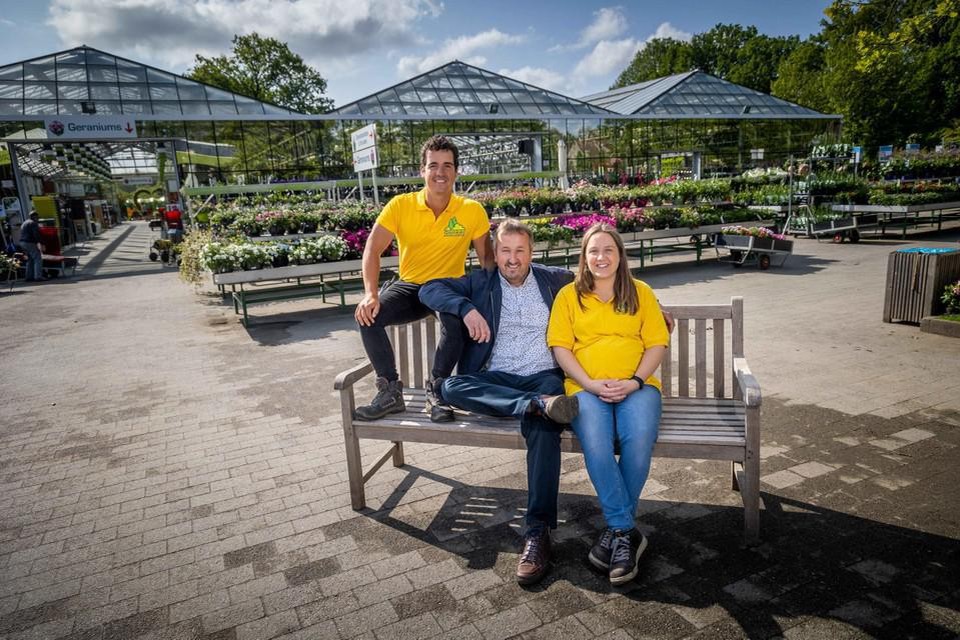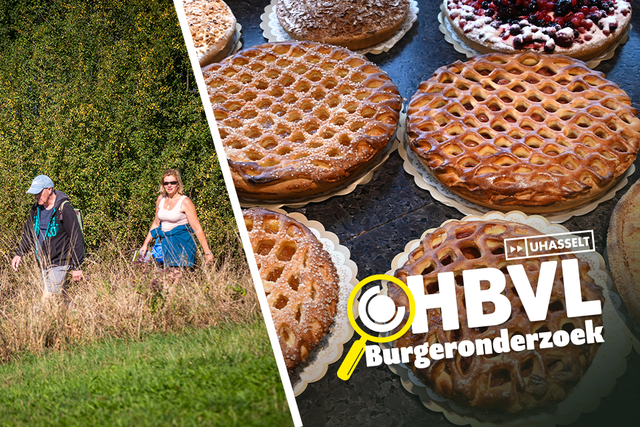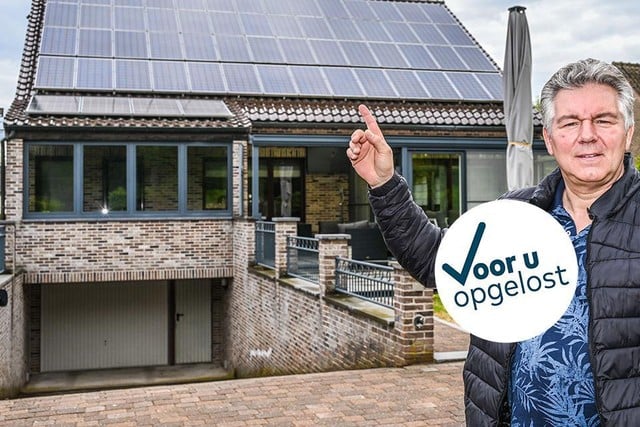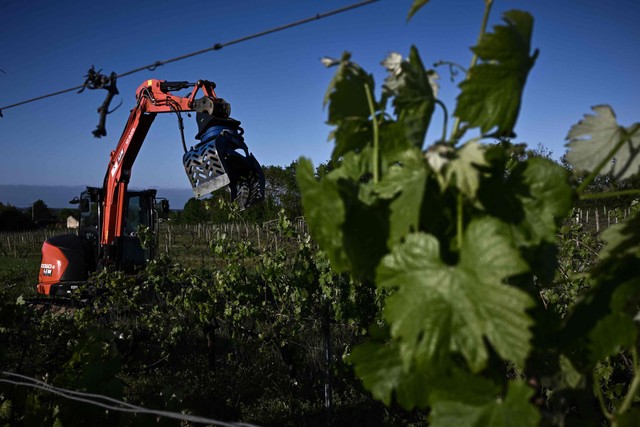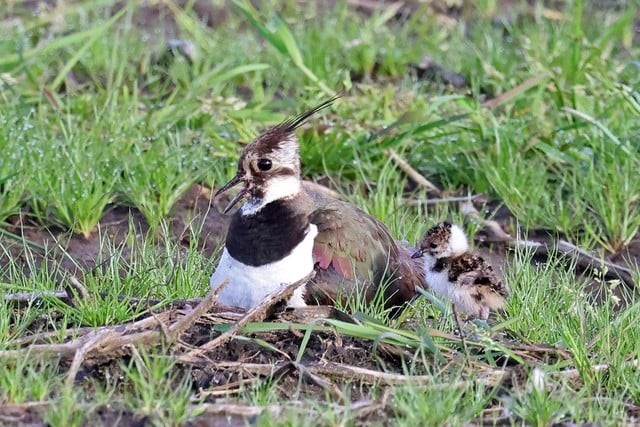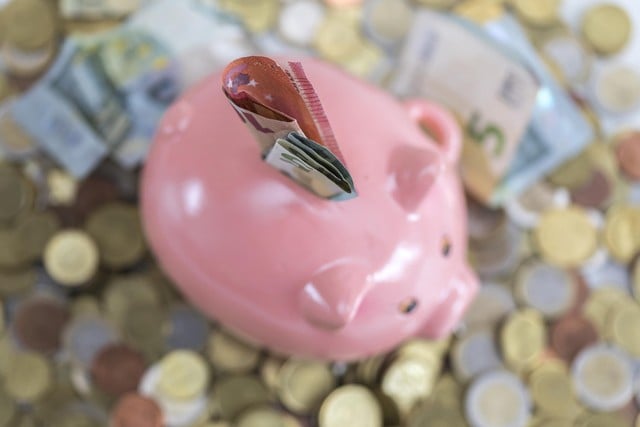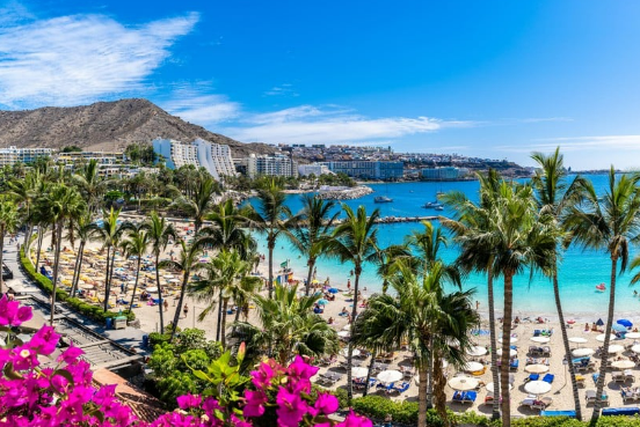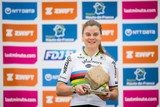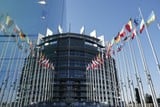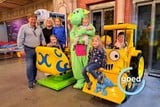© Karel Hemerijkcx
Bart Hiemeleers (Genker Plant Centre): “We sell 4,500 varieties, people come from far and wide for them.”
With 4,500 plants, the Genker Plant Centre has the largest selection in the Benelux. This month, there will be a large-scale celebration of ‘30 years of green happiness’. For owner Bart Hiemeleers, it’s the ideal moment to reveal who his successor will be, and talk about dipladenias and forsythias, as well as climate change and extra care for his son Roel
Top service above all at Genker Plant Centre. Owner Bart Hiemeleers is waiting for me in the car park, in a second-hand golf cart. A few of these carts drive around the site to transport equipment. The cart takes us to the site of the interview, amidst a colourful riot of plants. Fresh gerberas brighten the table. Peering over the fence, you can see the roofs of the family homes of the Hiemeleers family. Their commute is barely a few hundred metres. “I was born and raised down the street here, the middle of a warm family of five children,” Hiemeleers begins. “My grandfathers were miners, and my dad worked at Ford. So we’re about as Genk-ish as it gets (laughs). I have had a passion for gardening since childhood. One of my grandfathers maintained the gardens of the mining engineers, so I knew you could make money with that. My other grandfather was a hobby farmer in addition to being a miner. I wasn’t exactly an outstanding student in school, and subsequently chose the horticultural school in Sint-Truiden, where I was at boarding school for six years.”
So it’s quite a step to having your own plant centre, isn’t it?
“In school, I quickly became interested in propagating plants. By the time I was 14, I had already grown loads of plants and sold them to people I knew for pocket money. I got some space for it in the garden at home, and when I was 16 my father set up Plantencentrum Hiemeleers, as a secondary occupation. It quickly grew. People would ring the front doorbell, my mother would take the pans off the stove and go to the back of the garden to sell a few plants (laughs). After secondary school, I went on to specialise in Vught for two more years. After that, I did an internship with the Genk greenery service, which at the time still had its own nursery on De Maten nature reserve.”
But you had more ambition than just to sell some plants from your own garden?
“I was able to buy a piece of land from a farmer, and started the Genker Plant Centre here when I was 26. I was married by that time, we’d built a house and our two oldest children had already been born. I also did landscaping and laid clinkers at the time, but soon stopped that. My father wasn’t very happy with the new name at first, but I’m very happy with it now. Also because Genk has become a dynamic city, which gives our name extra cachet. In fact, my parents Magda and Maurice still helped out in the business until they were 76.”
So then the commercial space rapidly expanded?
“We started on a one acre site, with one plastic greenhouse. When customers wanted to pay, we went with them to the car with our little money bag and a calculator. Today have 20,000 square metres of commercial space. We are a pure plant centre, we hardly sell any accessories. So no barbecues or garden furniture. Just pots, soil and fertilizer. While in other garden centres, sometimes only 40% of the space is set aside for plants. Working that way does mean we get peaks and troughs. In April and May, we generate half our annual turnover.”
Then you also need peak staffing. Can you find staff easily?
“During that period, we have an extra 120 workers on top of our 30 permanent employees. Fortunately, we always find flexi-workers easily. For example, recently retired people, or people who work a full timetable at Nike or in the military with weekend posts and then come here during the week for a few more days. Getting unemployed people to work is becoming increasingly difficult. We also have more than 60 student workers and have trained 33 cashiers ourselves, working part-time. That’s necessary because when Genk officially became a tourist city, we immediately decided to open seven days a week. That makes things quite a challenge.”
Are you at work seven days a week yourself?
“Definitely in April and May. Then we get thousands of visitors every day. But we make sure that there are almost never more than three people queuing at the till. I don’t understand department stores that only open two tills, with long queues as a result. Our grandchildren have had a calming effect on my life. On Wednesdays, I can now be away from the business for a few hours. Then my wife looks after them. By the way, I owe a lot to Helena. Because she always took care of the children, I was able to focus on the business.”
How many plant varieties do you sell these days?
“Back in the day, we started with 500 varieties. We were fortunate that even then we had a few growers in Limburg who believed in us. We weren’t a family with a lot of money, but there were some growers who said I could defer payments for a year. Those people are still supplying us today. These days we sell 4,500 varieties. That’s why people come from far and wide. More than a quarter of our customers come from outside Limburg in any case. Of course, no one knows all of those 4,500 varieties. That’s why we’re split into 12 autonomous departments, each with its own specialists. My right-hand man Jo Moors maintains contacts with our 200 growers. Every Monday, we place our orders. We have one Dutch transport company that then drives out to all the growers, and everything is delivered from Tuesday to Thursday. Most growers are in the Benelux, with a few in Germany. We source the more exotic plants, such as palm trees and bamboo, mostly in Italy. Because we don’t work with middlemen, we can also offer competitive prices. The average visitor comes 2-3 times a year and spends around €60 on average each time.”
What are the top selling products today?
“Right now, patio plants and annual plants are the best-sellers. We see the biggest growth in sales in dipladenias, a nice alternative to geraniums. It’s a rewarding plant that grows all summer and doesn’t mind if it’s a little too dry or too wet every now and then. Hydrangeas are also selling well these days. And anything edible. From herbs and vegetables to fruit trees. For example, we now sell 15 types of tomatoes and five types of peppers. Corona brought people back to the garden and nature.”
Are some plants disappearing because of new trends or different lifestyles?
“Definitely. There used to be a forsythia, a golden bell, in every garden. Gardens are getting smaller, so shrubs three metres tall are less popular. When the box tree moth showed up, that shrub almost completely disappeared. As a replacement, we now primarily sell the ilex crenata.”
You also have a corner with exclusive plants?
“Those are usually a little bigger. They mainly come from Pistoia, an hour’s drive from Pisa. The region is surrounded by mountains and the microclimate makes the plants grow twice as fast. I travel to Italy for three days every year with Jo, to visit nurseries. We personally select the plants, hang our ribbons on them and then purchase for an entire year. That’s enough to fill a good seven or so trucks when they’re delivered in the spring.”
Is climate change also changing the product range?
“Absolutely. 30 years ago, I couldn’t sell a single palm tree. Now we’ve planted some that have grown 2.5 metres tall without much protection. The winters are less harsh these days. On the other hand, people are also mindful of buying native plants and want to make their gardens attractive to bees and butterflies. When I started, you had one kind of butterfly bush in five colours. Now you’ve got varieties that bloom longer, there’s a dwarf variety in ten colours. I think we’ll get to a total of 50 varieties.”
What efforts can a plant centre make in terms of sustainability?
“We try to follow the rhythm of nature as much as possible. In winter, we close for seven weeks. Nobody is out in their garden at that point, and we don’t have to use any energy. Then we just make sure our greenhouses are frost-free. We also capture our water as much as possible. There are ten 20,000-litre wells under our greenhouses. So we can reuse 200,000 litres and the rest can infiltrate into the surrounding sandy soil. So nothing goes down the drain. The checkout building is full of solar panels, we have eight charging stations in the car park. Our ergonomic work equipment is electric...”
Do you actually have to throw away any plants?
“Very few. It’s about 1% wastage. Thanks to our buyers and specialists. A plant won’t die if you take good care of it. Only the pot might get too small.”
Who are your main competitors? Other garden centres, department stores, the internet?
“All competitors have their unique selling points, but we stand out for the quality and range of our plants. It’s not for nothing that we’ve been voted best plant centre in the country by the Belgian Garden Centres Association, for the fourth time. With a score of 90.5%. That’s a lot more than I used to get in school (laughs). I was also delighted when we received the Genk Entrepreneur of the Year award from Unizo in 2019. Also because we make a contribution to the environment and the city. We attract a lot of people who plan to do other things in Genk. They drop their children off at the cinema, go for something to eat on the Vennestraat or visit Bokrijk.”
Partners
While grandchildren Jonas and Lisa play among the animals at mobile petting zoo Ter-Kozen, daughter Sofie (34) and son Pieter (27) also join us for breakfast. There’s a reason why. Proud father Bart informs them that they are now partners in the business. So that the future of the family business is assured. “Now that we’ve reached 30 years, we’re also going to celebrate for 30 days in June. We are treating our customers to 30% discounts on 30 items. After that, we’ll continue with three partners. I still want to be hard at work for another ten years or so, but the intention is for them to work their way up in the business. I’m still the sole shareholder for now, but we’ll adapt that step by step.”
Did you have to talk about it for a long time, as is the case with many family businesses?
“It was fairly straightforward when I realised they really wanted to go for it. It may have taken longer than expected because of the age difference. Sofie and Pieter are seven years apart, so Pieter joined the business later on. But they’re both hard workers. Incidentally, Pieter went to the same school I did.”
How will the roles be split between the three of you then?
“With Jo Moors and Kris Bynens, I have two right hand men to steer the business. That’s where Sofie came in. As she studied marketing, she is mostly involved in communications and the online stuff. And she’s now also greenhouse manager. I do the general policy. Pieter is responsible on the work floor for a number of departments and the car park. So now there are five of us who make up the management team.”
One person not at the table here is Roel, your eldest son. Does your life also revolve in part around the extra care he needs?
“Roel is a happy 36-year-old lad who does indeed need special care. He stays at the care facility Ter Heide six days a week, where he is in very capable hands. Roel has a mental disability and autism, and he can’t talk. The 24 hours a week he is with us, we do everything we can to make him comfortable, but that takes a lot of planning and structure. Roel doesn’t like surprises, for example. He was born with that disability. Fortunately, Sofie followed quickly and we didn’t realize something was different with Roel until after she was born. Otherwise, there might not have been a second child. Roel’s situation did make us realise how important a happy family is. What we learn from him most of all is how to enjoy the small things, how to live in the moment. When we go out for pancakes with him, he absolutely loves it. While we might be thinking: ‘The pancake from last week was actually tastier.’ He also enjoys nature, hiking and biking, going to the sea, eating good food. He has a ribbon hanging from his trousers to reassure him, that he always plays with.”
Has the company also allowed you to do some additional things for Roel?
“When he was 12, he came to Ter Heide and we always wanted to do something for the other residents there as well. When he was 18, we taught Roel to ride an electric wheelchair bike. That was only the third bike of its kind in Belgium at the time. When they rode around with the bike at Ter Heide, the reactions were fantastic, but that was only one bike for 440 residents. In fact, one of those bikes cost €7,000 back then, today it is up to €11,000. So three years later, we set up the non-profit organisation ‘Fietsplezier voor Iedereen’ (Cycling Fun for Everyone). Together with a few physiotherapists from Ter Heide, a few parents, Sofie, my father and several supporters, we managed to raise €100,000 in two years. That meant we were able to buy 16 bikes. That also gave a boost to volunteer work at Ter Heide, because taking someone out for the day is easier with a bike than with a wheelchair. We’ve now got more than 40 bikes at Ter Heide, and there are also bikes in many other institutions, including Home Fabiola in Maasmechelen. Sometimes you see 20 or so of the residents from Ter Heide cycling by. They have a chocolate milk, then set off again. It’s really heart-warming.”
A new generation in a company often brings new ideas as well. Has that been the case?
“We have been growing for 30 years, averaging 5% a year. The plan is to continue that trend. We also want to focus more on the visitor experience. One example is our three alpacas Thibau, Nina and Luca (laughs). Whoever guesses their weight this month could win a trip to Peru. Infant classes come here to learn about plants and bees. Institutions for people with disabilities, people with young dementia or retirement homes also come to visit. We also want to work more with examples around vegetable gardening, herbs and scents. Experiencing, inspiring and becoming aware is the future.”
Sofie: ”The shift to sustainability and the importance of green will definitely be put more in the spotlight. Climate change also calls for more robust plants. The days when you’d spray your lawn with tap water in hot summers will be a thing of the past, so people also need to be educated more about how to make their gardens more sustainable. With the Belgian horticultural centres, for example, we are behind the project ‘Tegelwippen’ (Get rid of your Tiles). Tile out, plant in. If every urban garden added a few climbing plants, it would greatly benefit biodiversity.”
To conclude, are your own gardens in good shape?
(all three burst out laughing) Bart: “Sofie has a nice front garden, let’s put it like that. But I won’t invite you into my back garden. It’s only small and is right next to the business, so this is my actually my back garden.”
Pieter: ”I met my girlfriend Chrissy here as an employee. She’s made sure our home is full of lovely houseplants.”
The breakfast ritual?
“I eat breakfast on the go. I just grab a few sandwiches, a cup of coffee, some fruit or yogurt and then I’m off. I always try to be at the morning briefing. After that, I have the bad habit of drinking a few more coffees at my desk.”
WITH COFFEE
What are your hobbies?
“I am an avid supporter of KRC Genk and go to all their home games. Our company has a few season tickets there. In the regular stand. I’m also just a regular guy from the Hengelhoefstraat. I talk to politicians, policy makers, people from healthcare facilities and we have clients from all walks of life, but I prefer to support the club among normal people. I also used to play squash, but there’s no squash court in Genk anymore. So I’ve switched to padel.”
Do you have a favourite holiday destination?
“We always close for seven weeks in the winter and then we head to sunnier climes for a few weeks, usually with the whole family. I think South-Africa is fantastic. We’ve also visited Kenya, New Zealand and Peru.”
Do you have a country retreat?
“Every summer we head to the Belgian coast for a few days. Especially for Roel, our oldest son who has a mental disability and can’t come with us on a plane. We’ve recently bought a bungalow in Sint-Idesbald, that we’ll refurbish ourselves. It’s 1 kilometre from the sea, and we’re going to call it Roel-land. It will be a home for him for the rest of his life.”
Do you support any charities?
“Mostly institutions for people with disabilities, because of Roel. This month we’re also celebrating the 15th anniversary of our non-profit organisation ‘Fietsplezier voor Iedereen’ (Cycling Fun for Everyone), but we also support everything in Genk related to sports for people with disabilities. I’ve also been a patron of Levensloop Genk for several years. With that, we raise around €200,000 a year for cancer research. In Peru, we are also supporting a Genk-based project around child care.”
What makes you unhappy?
“I have a hard time with people who are always complaining, and who bring other people down. I’d rather focus on the things that make me happy. I admire people who, despite great adversity, inspire others with their resilience.”
Bart Hiemeleers (56)
Company: Genker Plant Centre
Number of employees: 30 permanent employees. In addition, 55 flexi-workers and 65 student workers in the spring.
Family: married to Helena Pauwels. Children Roel (36), Sofie (34) and Pieter 27). Two grandchildren Lisa (3) and Jonas (1). A third one is on the way.
